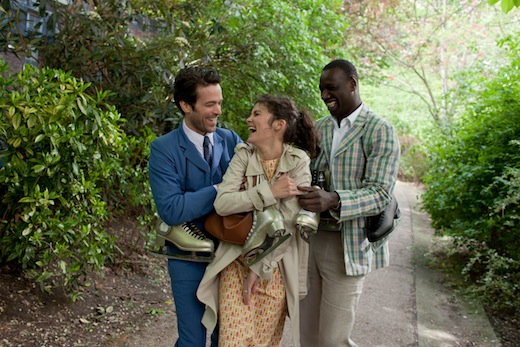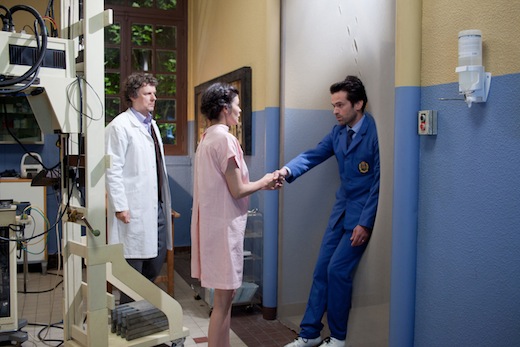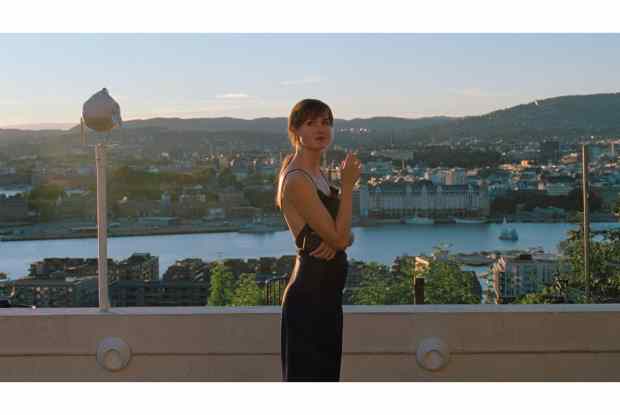Your enjoyment of Michel Gondry’s Mood Indigo may entirely depend on how much visual whimsy you can take, what your threshold might be, whether you can go with it or whether it wears you out and brings you to your knees. There’s animated food and little mice that zip around in cars and eels wriggling out of taps and rubbery human limbs that elongate and doorbells that scuttle like frenzied cockroaches — sit on that, Wes Anderson! You too, Terry Gilliam! — but it may be whimsy at the expense of coherence, feeling, story. My threshold is not that high, I now know.
This is an adaptation of Boris Vian’s 1947 novel L’écume des jours (Froth on the Daydream), which, apparently, has always had a cult following in France, and is always read by every French teenager, which may not be the soundest recommendation, but there you are. Vian was a polymath, novelist, poet, musician, actor, friend of Sartre, and the book, I’m given to understand, via the sort of in-depth research that can take nearly ten seconds on Wikipedia, is a surreal, sci-fi satire contemplating love, jazz and existentialism, as told through the eyes of our hero, Colin.

Colin (Romain Duris) is single and wealthy so does not have to work (for now). Colin dwells in what appears to be a pop-coloured suspended train carriage. Colin lives with a mouse (a human in a mouse costume, made miniature; has a tiny car) and those doorbells that scuttle and a piano that concocts cocktails and Nicolas (Omar Sy), whom he introduces as his ‘cook and lawyer’ but is, to all intents and purposes, his man-servant. Nicolas is black and his Driving Miss Daisy/Gone with the Wind eagerness to please, as well as later jokes referencing his sexual prowess, may be ironic. Or, at least, one is desperately hoping so. Still feels uncomfortably off, though.
Colin is lonely, but then meets Chloé (Audrey ‘most annoyingly pixie-ish woman of all time’ Tautou) at a party, and after hovering over Paris in a cloud car, as you do, they fall in love. Colin and Chloé are not dimensional. He’s a man-child, she’s a woman-child, and if the actors strike you as rather too old for such wide-eyed, breathless innocence then perhaps, like me, you were born without that part of the brain that can happily suspend disbelief. (It happens; a genetic mutation or something.) Colin and Chloé marry but, on their honeymoon, Chloé develops a cough — oh no, the dreaded film cough! — and is diagnosed with a condition, ‘water lily on the lung’, which can only be cured by surrounding her with live flowers and pills as pooed by a rabbit that then explodes. Colin devotes himself to her care but as her condition worsens the world shrinks, the sun disappears and all colour bleeds from the screen until we are left only with black and white.

Gondry (Eternal Sunshine of the Spotless Mind, Be Kind Rewind, The Science of Sleep) totally goes to town, and although the film may be as visually inventive as the book may be linguistically inventive — it is exceptionally inventive linguistically, my in-depth research has revealed — for the literal-minded born without that part of the brain, it is torture. What does it mean? Sure, the mouse is cute, but where is the satire, if it is satire? Is it trying to tell us that everything, ultimately, ends in decay and death? Why is Colin’s best friend obsessed with a philosopher who, for his part, has nothing interesting to say? Just wears huge glasses and does odd things with a pipe? Why did Chloé and Colin’s wedding have to turn into a drag race? Why is the ice-rink run by someone in cuckoo head? Can we go now? If we’re feeling all whimsied out?
There are some truly magical moments — rows of typewriters whizzing past typists on a conveyor belt; party guests dancing the ‘Biglemoi’ on elongated legs — but nothing seems related to anything else. It’s just conceit after conceit after conceit without discipline, without clarity, or anything substantial to hold on to. I am forgetting Colin and Chloé even as I’m trying to remember them. It’s a feast for the eyes. It’s an all-you-can-eat buffet for the eyes. But it will not feed you otherwise. Also, there is every chance it will bring you to your knees.
Got something to add? Join the discussion and comment below.
Get 10 issues for just $10
Subscribe to The Spectator Australia today for the next 10 magazine issues, plus full online access, for just $10.
You might disagree with half of it, but you’ll enjoy reading all of it. Try your first month for free, then just $2 a week for the remainder of your first year.













Comments
Don't miss out
Join the conversation with other Spectator Australia readers. Subscribe to leave a comment.
SUBSCRIBEAlready a subscriber? Log in